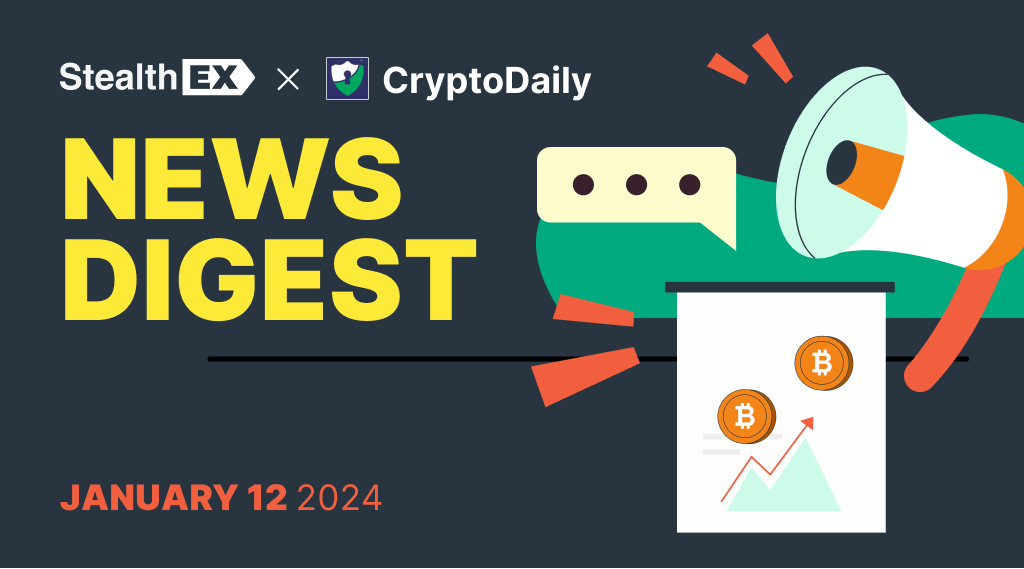StealthEX & CryptoDaily: SEC Approves First Spot Bitcoin ETFs

Welcome to our weekly crypto update, courtesy of StealthEX and CryptoDaily! Our mission is simple: provide a clear and brief overview of the major happenings and trends in the cryptocurrency world. We’re here to keep you up-to-date with the freshest developments in the industry. Ready to explore the top stories from this past week? Let’s jump right in!

SEC Approves First Spot Bitcoin ETFs: A Game-Changer for Crypto Investment
The U.S. Securities and Exchange Commission (SEC) has officially approved the first regulated spot Bitcoin Exchange-Traded Funds (ETFs), marking a significant milestone in the cryptocurrency sector. This decision, announced on January 9, 2024, follows a series of applications from firms such as ARK 21Shares and Invesco Galaxy, signaling a major shift in the regulatory approach towards digital assets.
Spot Bitcoin ETFs allow investors to gain exposure to Bitcoin’s price movements without the need to directly purchase or store the cryptocurrency. This development is expected to attract a broader range of investors, including those who prefer traditional investment vehicles but are interested in cryptocurrency exposure.
The journey to this landmark decision was not straightforward. The SEC had previously denied numerous applications for spot Bitcoin ETFs, citing concerns about market manipulation and fraud. The turning point came with a legal victory by Grayscale in August 2023, which led to the SEC reconsidering its stance and eventually approving these ETFs.
The approval of spot Bitcoin ETFs is anticipated to bring significant inflows into the cryptocurrency market. Industry analysts express a generally bullish sentiment, expecting these ETFs to attract both retail and institutional investors. The move is also seen as a validation of Bitcoin’s growing acceptance in the mainstream financial world.
The SEC’s approval of spot Bitcoin ETFs represents a watershed moment for the cryptocurrency industry, potentially paving the way for increased institutional adoption and a new era of crypto investment strategies. As the market adapts to this development, it will be crucial to monitor the long-term effects on Bitcoin’s price and the broader digital asset ecosystem.
CFTC Report Sheds Light on DeFi’s Regulatory Challenges
The United States Commodity Futures Trading Commission (CFTC) has recently published a comprehensive report addressing the significant regulatory challenges faced by the decentralized finance (DeFi) sector. This report underscores the urgent need for increased accountability and clear regulatory guidelines within the rapidly evolving DeFi landscape.
Report, spearheaded by Commissioner Christy Goldsmith Romero, delves into the complexities of digital assets and the DeFi ecosystem. It emphasizes the necessity for a thorough understanding of digital assets to prevent potential adverse outcomes. The report aims to inform ongoing policy discussions among U.S. Congress, state legislatures, and regulatory bodies, including the CFTC itself.
While acknowledging the benefits of DeFi, the it also points out its drawbacks, particularly the risks associated with illicit funding and cybersecurity threats. It notes that DeFi systems range from centralized to decentralized structures, each with unique characteristics and challenges.
The CFTC’s report builds upon a previous report by the Department of Treasury, which highlighted the risks of illicit financing in the DeFi ecosystem. It calls for increased engagement between federal regulators and industry stakeholders to address these risks effectively.
A significant concern raised in the report is the lack of accountability and responsibility within DeFi systems. This ambiguity poses risks to consumers, investors, and the integrity of financial markets. The report advocates for collaborative efforts between government and industry players to establish clear regulatory frameworks and combat DeFi exploits and illicit activities.
The CFTC emphasizes the need for comprehensive resource assessment, data collection, and policy actions to mitigate risks in the DeFi space. It highlights the importance of collaboration with both local and global organizations in setting standards and regulations for the DeFi industry.
PayPal’s PYUSD Stablecoin Embraces DeFi for Enhanced Liquidity
PayPal’s foray into the stablecoin market with PYUSD has taken a strategic turn, as it now leverages decentralized finance (DeFi) to boost its liquidity. This move is a significant step for PYUSD, which has been trailing behind more established stablecoins like USDT and USDC.
PayPal introduced PYUSD to the stablecoin ecosystem, marking a notable entry by a major financial entity into this space. Despite the initial buzz, PYUSD faced challenges in competing with leading stablecoins in terms of trade volumes. To address this, PYUSD has activated the Curve automated market maker and is seeking deployment on Aave, a prominent DeFi lending platform.
In December 2023, PYUSD activated on Curve, launching the FRAXPYUSD liquidity pool. This pool, which includes Frax Finance’s FRAX stablecoin, quickly became the third-largest on Curve with a total value locked (TVL) of $135 million. This integration allows FRAX holders to swap their tokens for PYUSD, which can then be used for transactions on the PayPal app.
The proposal to onboard PYUSD onto Aave’s Ethereum pool is currently under vote, with expectations of seeding the liquidity pool with $5-10 million if approved. This move is anticipated to create organic borrowing demand for PYUSD on Aave, facilitated by high yields on Curve.
Paxos, the entity behind PYUSD, has collaborated with Trident Digital, a crypto platform focused on improving token liquidity on-chain. This partnership aims to enhance PYUSD’s position in the market and address the “stablecoin Matthew effect,” where liquidity tends to follow established players.
This article is not supposed to provide financial advice. Digital assets are risky. Be sure to do your own research and consult your financial advisor before investing.
Bitcoin Bitcoin ETF crypto world DeFi SECRecent Articles on Cryptocurrency
 SPX6900 Price Prediction: Is SPX Coin a Good Investment?
SPX6900 Price Prediction: Is SPX Coin a Good Investment?  First Neiro on Ethereum Price Prediction: Can NEIRO Crypto Hit $10?
First Neiro on Ethereum Price Prediction: Can NEIRO Crypto Hit $10? 